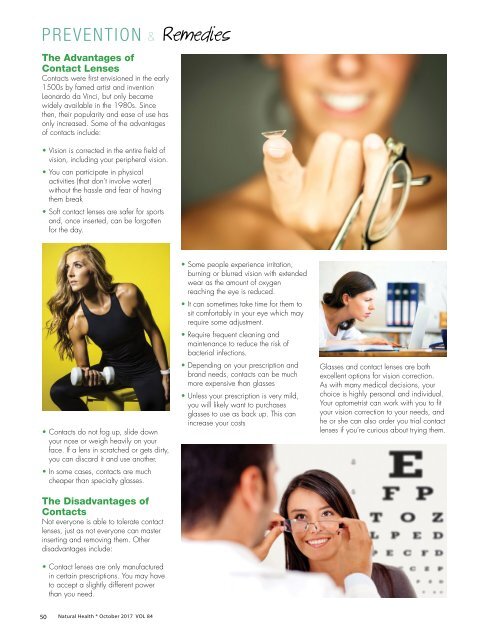Natural Health October 2017
Create successful ePaper yourself
Turn your PDF publications into a flip-book with our unique Google optimized e-Paper software.
PREVENTION & Remedies<br />
The Advantages of<br />
Contact Lenses<br />
Contacts were first envisioned in the early<br />
1500s by famed artist and invention<br />
Leonardo da Vinci, but only became<br />
widely available in the 1980s. Since<br />
then, their popularity and ease of use has<br />
only increased. Some of the advantages<br />
of contacts include:<br />
• Vision is corrected in the entire field of<br />
vision, including your peripheral vision.<br />
• You can participate in physical<br />
activities (that don’t involve water)<br />
without the hassle and fear of having<br />
them break<br />
• Soft contact lenses are safer for sports<br />
and, once inserted, can be forgotten<br />
for the day.<br />
• Contacts do not fog up, slide down<br />
your nose or weigh heavily on your<br />
face. If a lens in scratched or gets dirty,<br />
you can discard it and use another.<br />
• In some cases, contacts are much<br />
cheaper than specialty glasses.<br />
The Disadvantages of<br />
Contacts<br />
Not everyone is able to tolerate contact<br />
lenses, just as not everyone can master<br />
inserting and removing them. Other<br />
disadvantages include:<br />
• Contact lenses are only manufactured<br />
in certain prescriptions. You may have<br />
to accept a slightly different power<br />
than you need.<br />
• Some people experience irritation,<br />
burning or blurred vision with extended<br />
wear as the amount of oxygen<br />
reaching the eye is reduced.<br />
• It can sometimes take time for them to<br />
sit comfortably in your eye which may<br />
require some adjustment.<br />
• Require frequent cleaning and<br />
maintenance to reduce the risk of<br />
bacterial infections.<br />
• Depending on your prescription and<br />
brand needs, contacts can be much<br />
more expensive than glasses<br />
• Unless your prescription is very mild,<br />
you will likely want to purchases<br />
glasses to use as back up. This can<br />
increase your costs<br />
Glasses and contact lenses are both<br />
excellent options for vision correction.<br />
As with many medical decisions, your<br />
choice is highly personal and individual.<br />
Your optometrist can work with you to fit<br />
your vision correction to your needs, and<br />
he or she can also order you trial contact<br />
lenses if you’re curious about trying them.<br />
50 <strong>Natural</strong> <strong>Health</strong> * <strong>October</strong> <strong>2017</strong> VOL 84

















